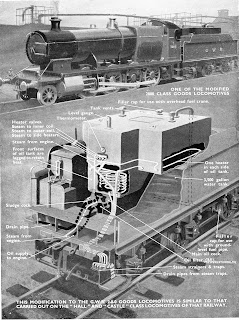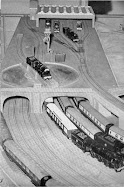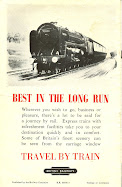Also available as a model by Bachmann
Welcome
Welcome to the Lickey Incline blog devoted to the celebration of the railway and in particular the great days of steam trains both standard and narrow gauge, on the railways of Britain.
Tuesday, June 14, 2011
Tuesday, June 07, 2011
Watching trains on film
Love Film has 439 railway documentary films including the 'Railway Roundabout' series, Railway Walks with Julia Bradbury and the British Transport Commission series of films and many more to rent or buy plus feature films with a railway theme such as 'The Train'

Saturday, June 04, 2011
More illustrations by the artist A N Wolstenholme

 |
| Tender arranged for oil firing
Drawing by A N Wolstenholme
|
The illustrations by A N Wolstenholme of the GWR 2-8-0 seen to the left and below were were used to support an article on the Great Western Railway oil firing project described by B W Anwell in the Ian Allan Trains Annual for 1948. The article also includes some notes by Cecil J Allen of a footplate trip on an oil fired GWR Castle Class locomotive.
"By way of commentary on (oil firing) ..., some details supplied by Mr. Cecil J. AlIen of a recent footplate trip on G.W.R. No. 5039, Rhuddlan Castle, one of the four engines of this class fitted to burn oil fuel, by the kind permission of Mr. F. W. Hawksworth, Chief Mechanical Engineer, G.W.R., are of particular interest. The train concerned was the 3 p.m. from Bristol to Paddington, and although the schedule is easy enough, the load, after Swindon especially, was substantial, and some very fast running was made between stops. "The first impression made on anyone familiar with the foot¬plate," Mr. AlIen writes," is the fact of the permanently closed and sealed-up firedoor, and the tender front from which no coal is ever taken. The second, as you have described, is that the fireman, though relieved of the physical labour of firing and comfortably accommodated on a padded seat, has to concentrate more closely on his work than with manual firing.
"The enginemen with whom I rode were Driver Pollard and Fireman Green, of Old Oak Common shed, and the liaison between them was perfect. Every movement of the engine regulator and cut-off was accompanied by a suitable variation of the fireman's oil and steam controls, and the fireman was particularly alert to shut off the oil feed directly the regulator was closed. The efficiency of his work was measured by the colour of the smoke issuing from the chimney, and the dampers were adjusted from time to time to control the air supply to the firebox. Throughout the journey the steam pressure was maintained without the slightest difficulty at the 225 lb. mark.
"Out of Bristol we had a ten-coach train of 310 tare tons, or 330 tons gross; from Swindon it was increased to 346 tare tons, or 370 tons in all behind the engine tender. One smart piece of work was when we mounted Dauntsey bank-2 miles at I in 100 ¬with no greater drop in speed than from 60 to 51 m.p.h.; here the engine regulator was full open and we were cutting off at 20 per cent. On the easy grades beyond Swindon, 15 per cent cut-off soon raised the speed to 70 m.p.h. and from Maidenhead to Slough the engine ran freely at 71 m.p.h. on the level with 17 per cent cut-off.
" Among the lively start-to-stop times made was one of 15 minutes, 30 seconds for the 13.4 miles from Swindon to Challow, and another of 13 minutes, 23 seconds (13 minutes net) for the 10.8 miles from Challow to Didcot; we should have covered the 16.7 miles from Chippenham up to Swindon in 20 minutes, but for a signal check. The brightest running of all was when we passed Southall, 26.9 miles from Reading start, in 27 minutes, 7 seconds. It was an impressively efficient performance."
The full meaning and extent of the oil-burning conversion scheme in this country may now perhaps be realised, and the reason for its estimated cost of many thousands of pounds appreciated. If it achieves nothing else, let us hope that, as far as oil-burning locomotives are concerned, we shall never again hear that age-old excuse for late running -" short of steam! "
copyrights acknowledged

 |
| Cab and Firebox arranged for oil firing on GWR 2-8-0 Drawing by A N Wolstenholme |
Labels:
A N Wolstenholme,
Castle,
Collet,
GWR,
Hawkesworth,
Ian Allan,
illustrator,
oil firing,
railway artist,
Rhuddlan Castle
Subscribe to:
Posts (Atom)







